Graphic Courtesy of the Recording Academy
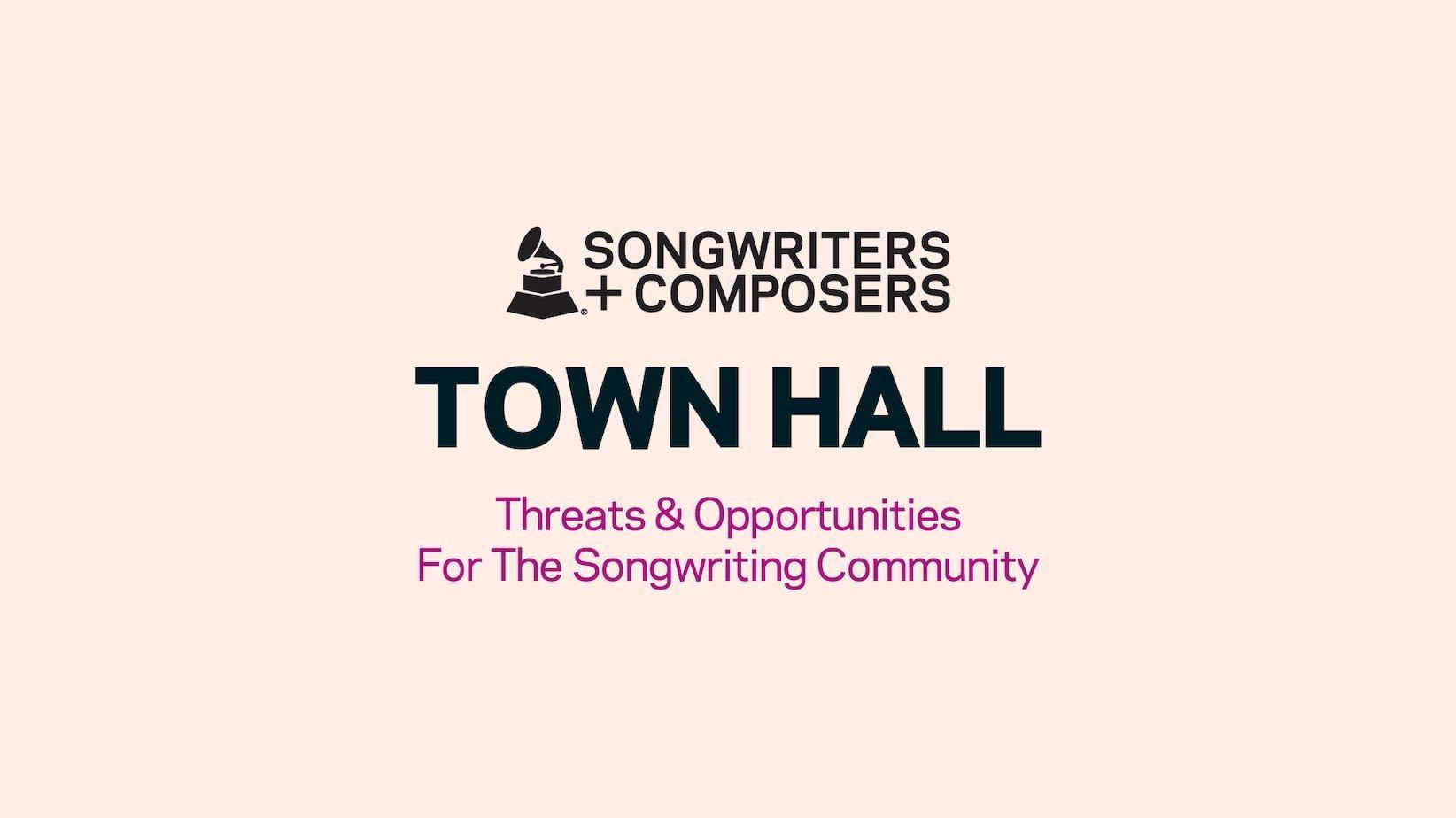
list
4 Lessons & Resources Every Songwriter & Composer Should Know
The 2024 Songwriters & Composers Wing Town Hall featured four panels exploring the evolving trends, emerging opportunities and potential challenges impacting the songwriting and composing industry. Here are four key lessons we learned from the Town Hall.
The business of creating music is ever-changing, and the present is no different. The music industry is evolving rapidly, as the Recording Academy's 2024 Songwriters & Composers Wing Town Hall attests.
To explore these changes, the Recording Academy's Songwriters & Composers Wing, in collaboration with our Washington, D.C.-based Advocacy & Public Policy team, yesterday held A Songwriters & Composers Town Hall - Threats & Opportunities for the Songwriting Community, an industry learning event that explored the evolving trends, emerging opportunities and potential challenges within the craft and industry of songwriting and composing across four insightful panels.
As industry leaders within the craft of songwriting, the Songwriters & Composers Wing launched in March 2021 during the 2021 GRAMMYs to advocate for and support all songwriters and composers within the Recording Academy's membership and the industry at large. The Wing's 2024 Town Hall brought these issues to the forefront, examining the current state of the industry and informing the songwriting and composing community about the path ahead.
These vital music industry issues will be further discussed on Music Advocacy Day 2024 on Tuesday, Oct. 1. Celebrating its 10th anniversary, Music Advocacy Day, the largest grassroots music advocacy effort in the nation, has affected policy change and positively benefited the creators, artists and industry professionals who power the music industry.
Here are four key lessons from A Songwriters & Composers Town Hall - Threats & Opportunities for the Songwriting Community.
Stay Present & Build Relationships With Publishing Companies
In a helpful, wide-ranging conversation, Recording Academy CEO Harvey Mason jr. and publishing attorney Guy Blake, a Partner at Granderson Des Rochers, LLP, provided new writers with advice on negotiating publishing deals. They were advised to make a long-term business plan for what they want from a publishing deal — financially and otherwise. The Opportunities For Songwriters panel also discussed industry tips, including building in bonuses for hits.
In the era of AI, Mason jr. and Blake both advised songwriters and composers to stay present and build relationships with their publishing companies. Artists should share specific goals about where they want their music to go.
"There's nothing wrong with wanting money," Blake assured. "Unlike a lot of deals in our industry, a music publishing advance, if you will, is one of the few pieces of money that actually goes into your pocket. In a recording agreement, a lot of that money is used in the budget. So it's OK to use a publishing deal as a way of banking up. But know what you're going to do with that money, know how you're going to reinvest that money into your career." And don't forget to pay your taxes, he added.
Self-Advocate With The Help Of The MLC
Susan Stewart, Sr. Managing Director of the Songwriters & Composers Wing, and Ruby Amanfu, a two-time GRAMMY-nominated songwriter and member of the Wing's Leadership Council, interviewed Mechanical Licensing Collective (The MLC) CEO Kris Ahrend about the importance of self-advocacy and discussed the nonprofit organization's resources. Stewart and Amanfu asked why creators — including those who serve as self-administered publishers — should connect with The MLC, which advocates for creators' rights and fair compensation.
"We probably have money for you!" Ahrend noted as one of the most important reasons.
A matching tool on The MLC website allows songwriters to search for paid uses of their work that they may not know about, such as on a streaming service, and then make a claim to get paid. Making sure personal data is updated and correct with publishers, or as self-publishers, can help facilitate payments.
"Songwriters need to get on there and start matching!" said Amanfu, who has co-written GRAMMY-nominated songs by H.E.R. and Alicia Keys and Brandi Carlile. She found funds owed to her by using The MLC's tool.
In May, The MLC filed a lawsuit against Spotify alleging that the streaming company is allegedly underpaying royalties to songwriters and publishers.
"It is really imperative for The MLC to take action in situations like this," Ahrend said.
Fighting The "War Against Songwriters" With The NMPA
Todd Dupler, Chief Advocacy & Public Policy Officer for the Recording Academy, and David Israelite, president and CEO of the National Music Publishers' Association (NMPA), continued the legal discussion in the A Conversation With The NMPA panel. The pair explained how songwriters are impacted by changes to streaming royalties and songwriter payouts and what they can do to push back. Unlike record labels and artists — both of which can negotiate their value to a streaming service — songwriters are paid a rate regulated by federal law. As a result, any changes in the wrong direction will hit songwriters harder.
The NMPA is fighting what Israelite called "a declaration of war against songwriters" by filing a complaint with the Federal Trade Commission against Spotify which recently changed its payout calculations to the detriment of songwriters. The complaint was filed with 10 U.S. states with strong consumer protection laws, which NMPA believes were violated; separately, the NMPA has called on Congress to take a "fresh look" at this government-set compensation system.
"This is not a company that cares about songwriters or how they feel, so they're not going to change their course of action," Israelite said of streaming services such as Spotify. "If they can save $150 million, they're gonna do it — unless their hand is forced."
Know Your Strengths & Power As A Songwriter
Anyone in the music business, aspiring or otherwise, would benefit from advice from Julian Bunetta and Steph Jones, multi-genre songwriters/producers who co-wrote Sabrina Carpenter's inescapable summer hit "Espresso." They joined the Recording Academy's Susan Stewart and Todd Dupler in the A Conversation With Songwriters panel to share their most practical wisdom for new songwriters.
"I would first remind yourself of why you like doing what you're doing," said Jones, who has also written songs for Kelsea Ballerini, Pink, Selena Gomez, and Little Big Town. "Because I think that will carry you through a lot of hard times if you stay connected to why it is you're doing this in the first place."
Jones also emphasized the importance of being a strong team member. "Really hone in on what your strength is in the room … Learn how to serve a writing room."
Bunetta, a member of the Songwriters & Composers Wing's Leadership Council who has also written songs for the likes of Harry Styles, Teddy Swims, One Direction, and Thomas Rhett, said that his father always told him that it isn't "who you know — it's who you avoid."
"You have to do your due diligence and understand what songwriting is, how you get paid," he said. "If you were playing basketball, you would know the rules, wouldn't you?"
Jones thinks the biggest mistake a songwriter can make is not understanding their own power — or thinking a tide of popularity is endless. "Every wave you ride, it lands again," she said.
Watch the A Songwriters & Composers Town Hall - Threats & Opportunities for the Songwriting Community in full below.
Latest Recording Academy News & Initiatives
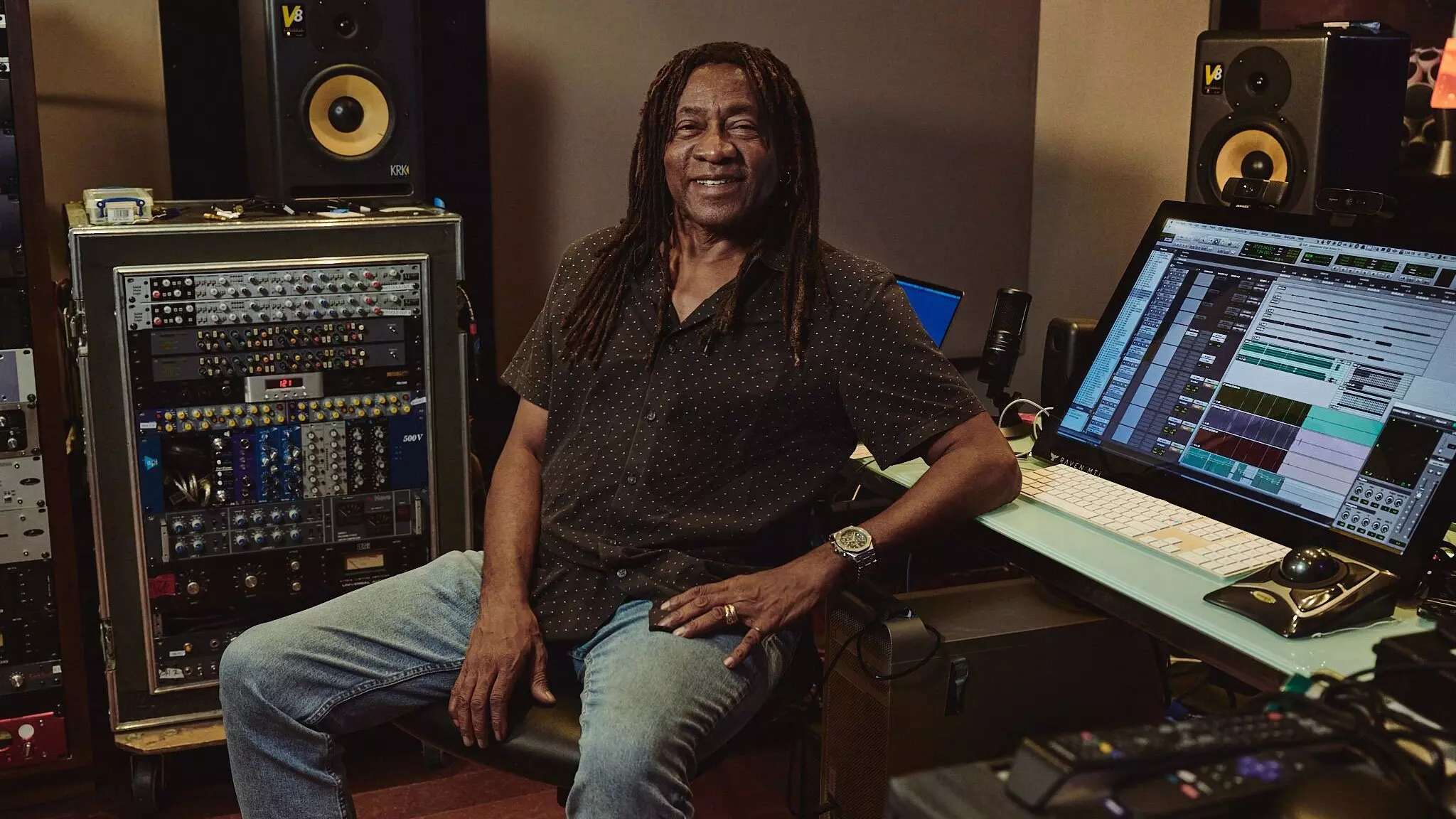
The Recording Academy Producers & Engineers Wing To Honor Jimmy Douglass During 2025 GRAMMY Week Celebration
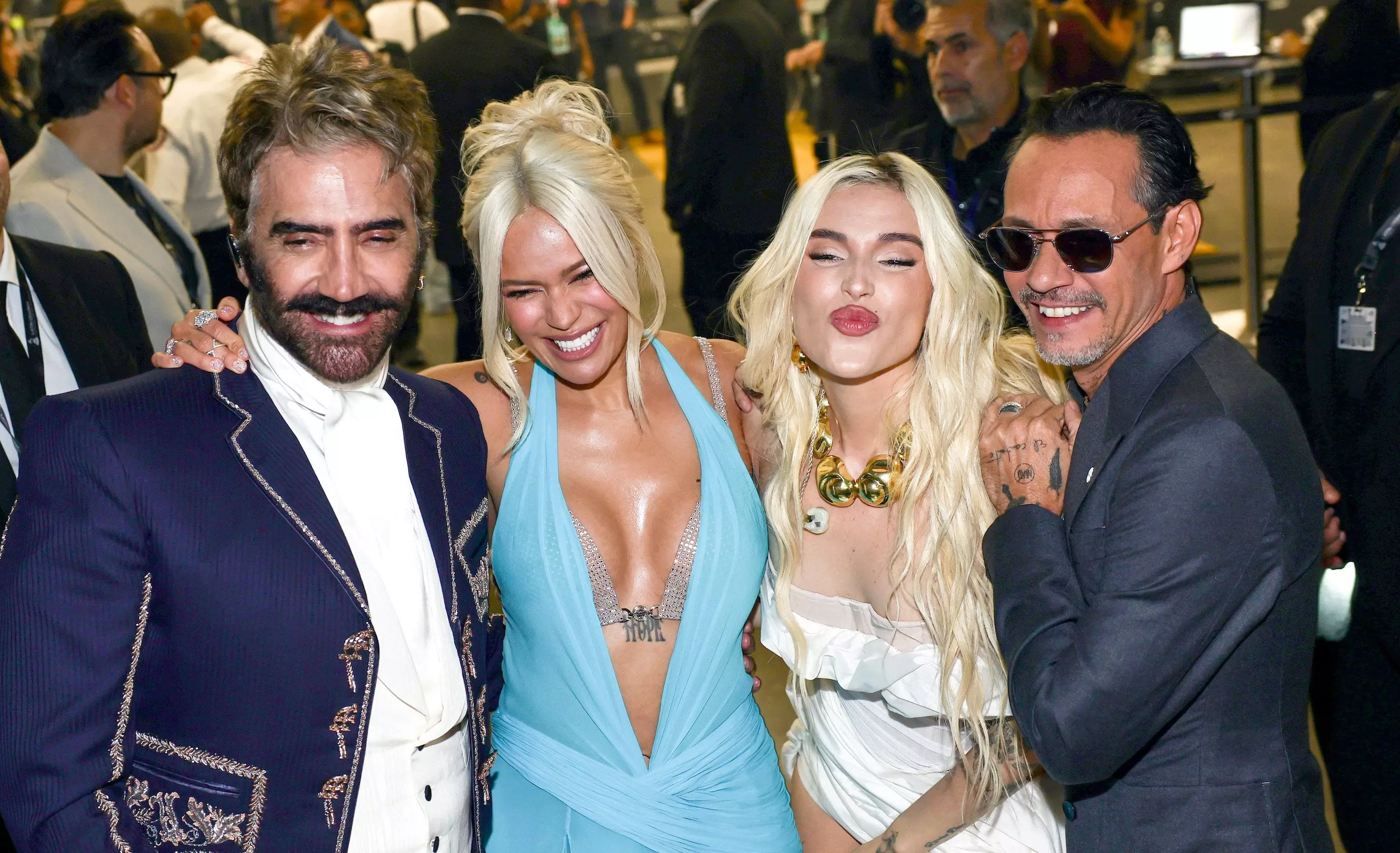
10 Meaningful Moments From The 2024 Latin GRAMMYs: Karol G's Heartfelt Speech, Tributes To Late Legends & More
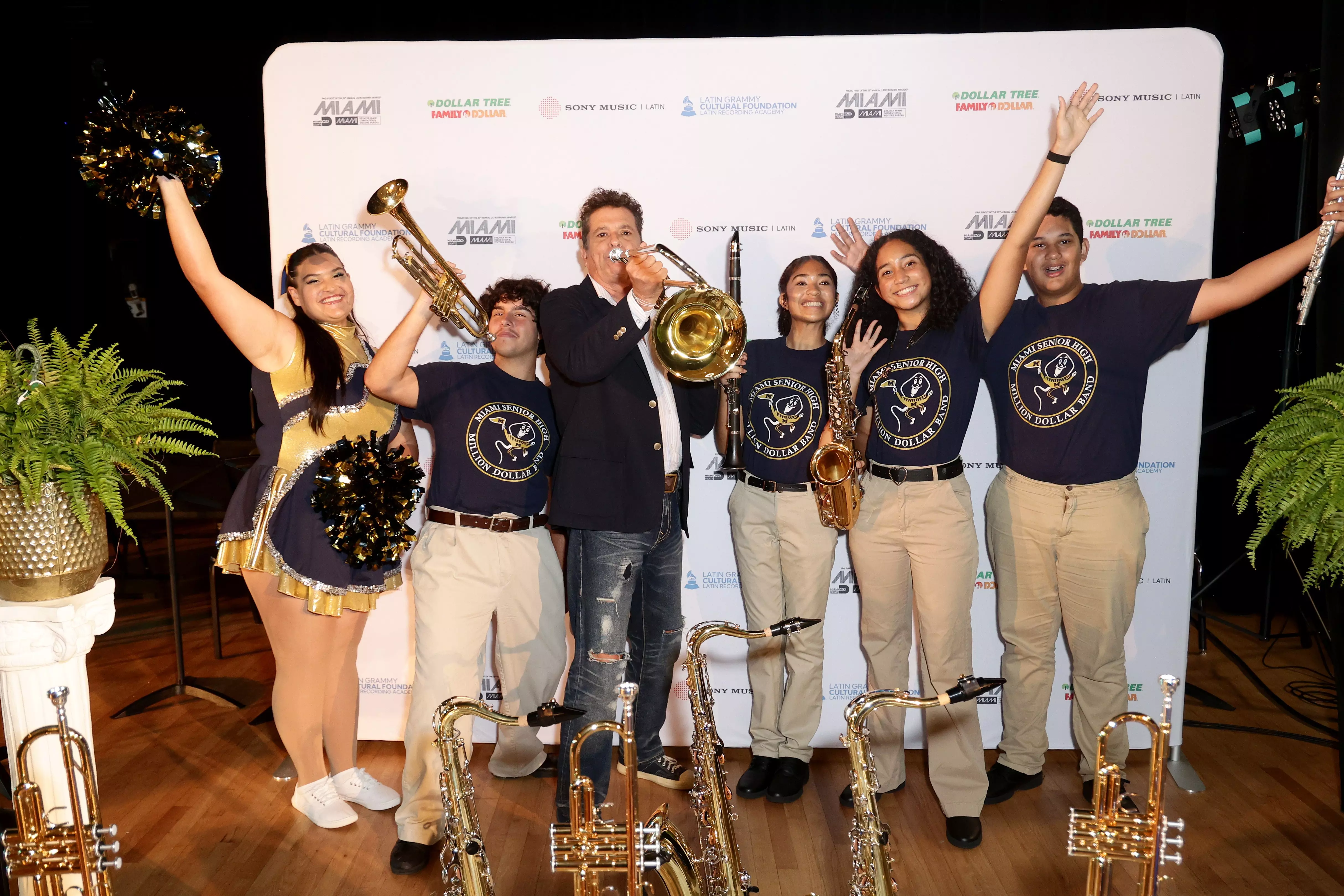
Behind The Scenes At Latin GRAMMY Week 2024: Inside VIP Celebrations & More
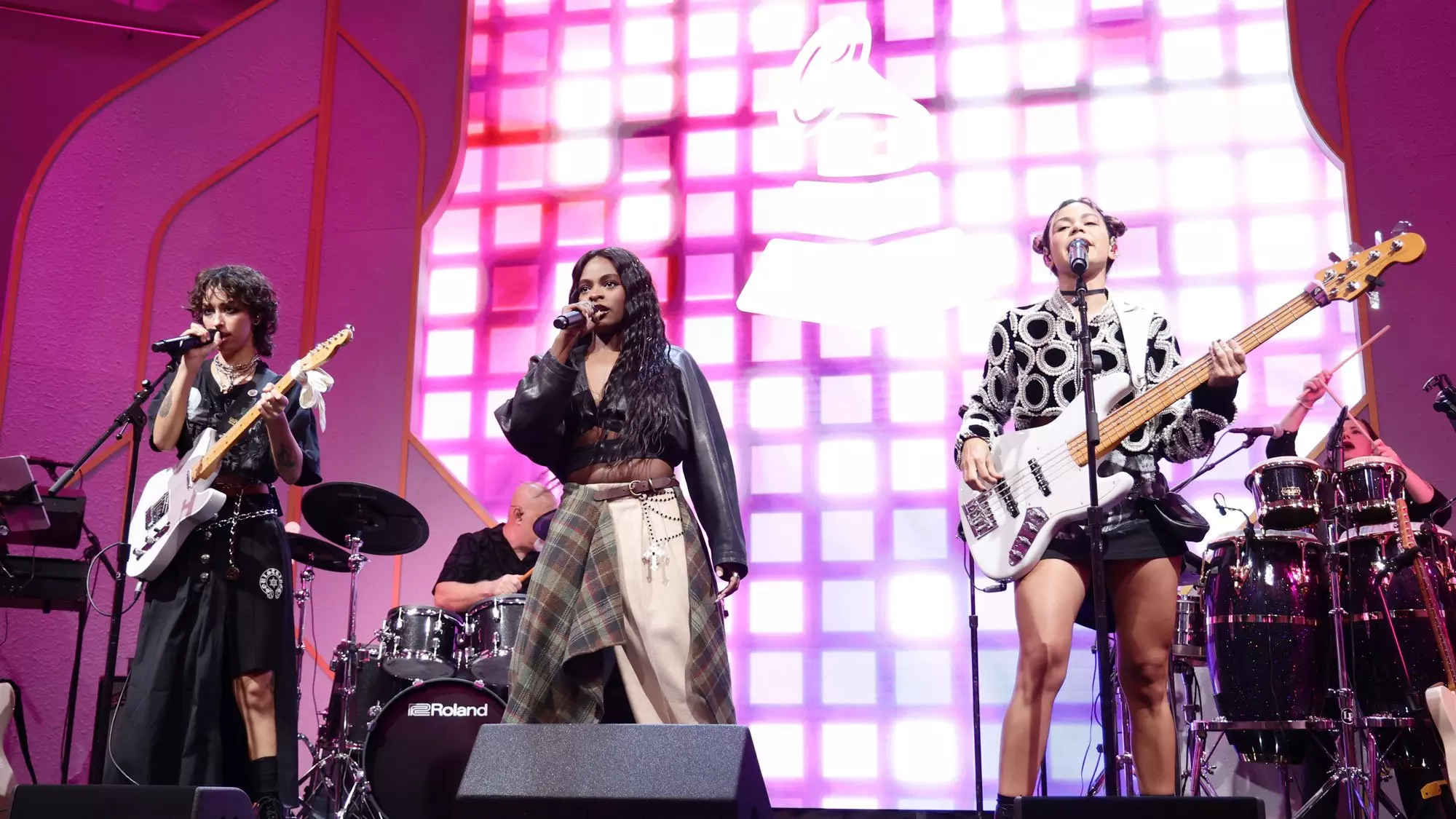
Agris, DARUMAS, Ela Taubert, Kevin Aguilar & More Perform At The 2024 Latin GRAMMYs Best New Artist Showcase
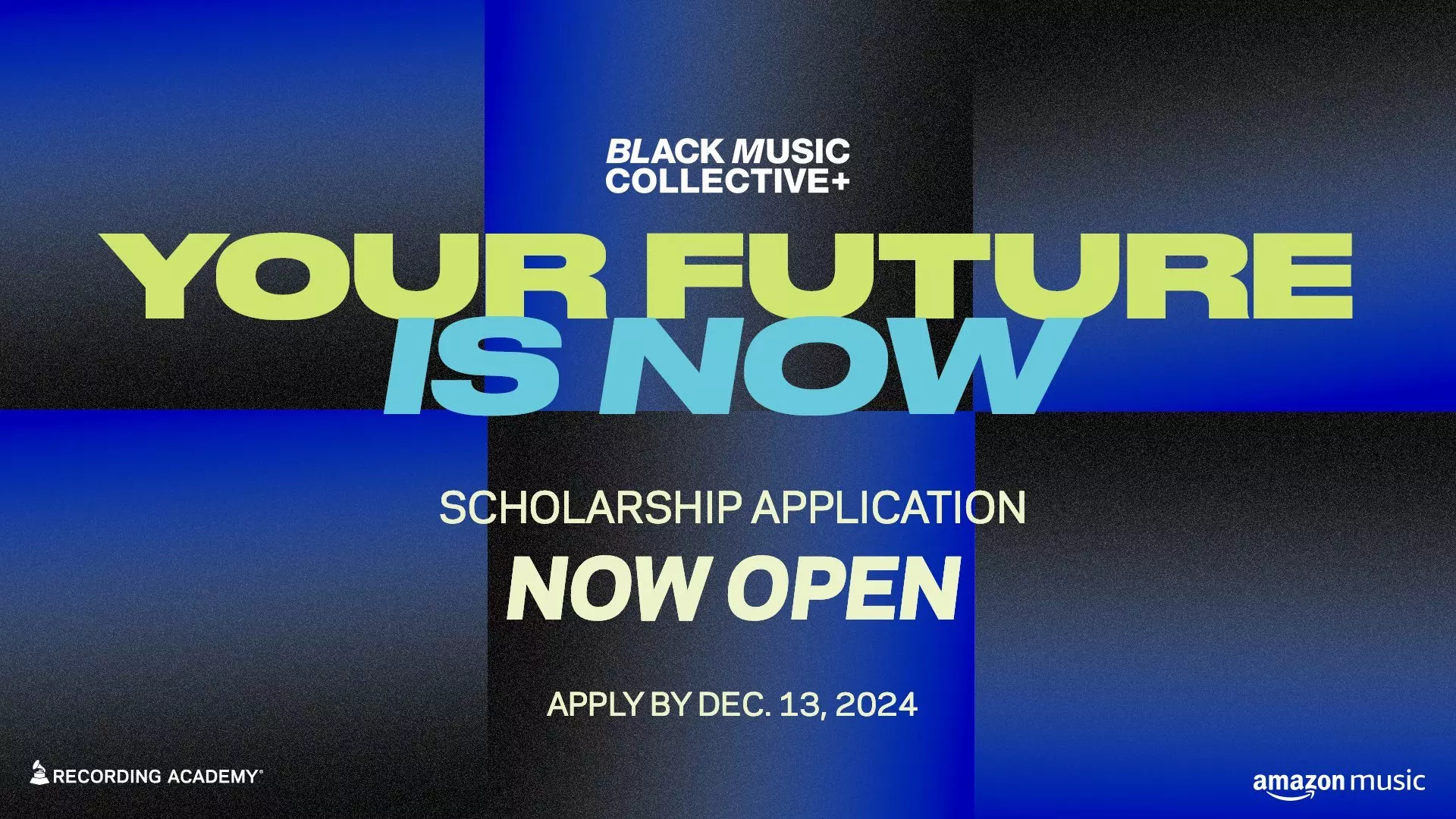
Amazon Music & Black Music Collective Announce Fourth Annual 'Your Future Is Now' Scholarship Program For HBCU Students
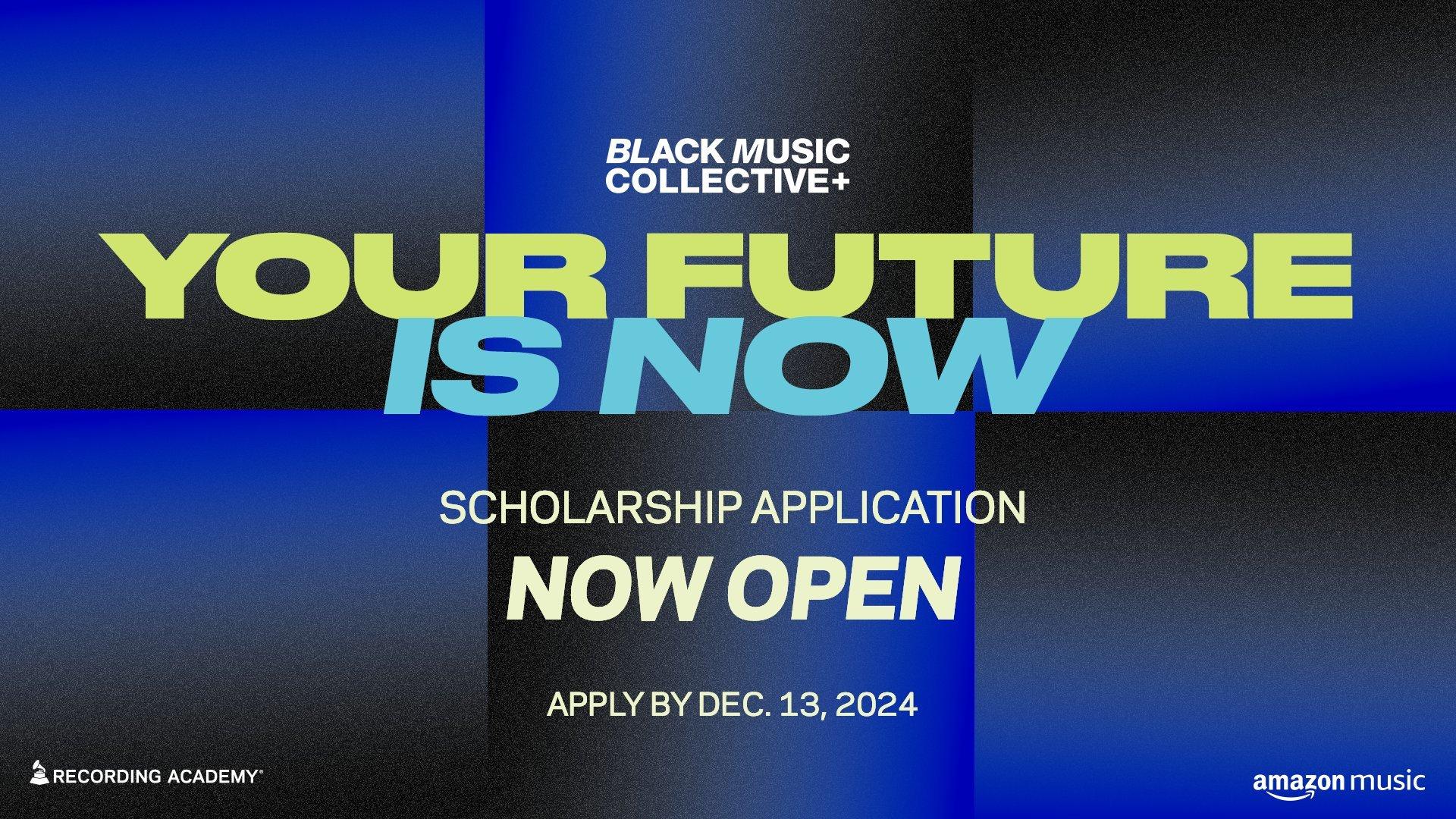
Graphic courtesy of the Recording Academy
news
Amazon Music & Black Music Collective Announce Fourth Annual 'Your Future Is Now' Scholarship Program For HBCU Students
The program provides hands-on music industry experience through mentorship opportunities and financial support to HBCU students and music programs. Scholarship applications are open now through Dec. 13.
In a continuing commitment to nurture future Black music industry leaders, Amazon Music and the Recording Academy’s Black Music Collective (BMC) have announced the return of the Your Future Is Now scholarship program for its fourth consecutive year.
The program, which launched in 2021, provides students from Historically Black Colleges and Universities (HBCUs) with both financial support and direct, hands-on experience in the music industry.
This year, five HBCU students will be awarded a $10,000 scholarship each and have the chance to engage in a career-defining rotation with department leads at Amazon Music and the Recording Academy. Alongside the individual scholarships, the program will grant two HBCUs $10,000 each for music program equipment, further investing in institutional resources for budding artists and music professionals.
To celebrate the scholarship's renewal, "Amazon Music Live" featured an exclusive episode headlined by GRAMMY-nominated hip-hop heavyweight, Big Sean, sponsored by the all-new 2025 Nissan Kicks. This special live streamed performance included Big Sean performing alongside North Carolina Agricultural and Technical State University's celebrated Blue and Gold Marching Machine and The Fellowship Gospel Choir, bringing a powerful, HBCU-rooted energy to the show.
Following the concert, North Carolina A&T was announced as the first HBCU recipient of the $10,000 music equipment grant, with Amazon Music executives Phylicia Fant and Jameka Pankey, alongside Recording Academy representatives, presenting the donation to the university’s drumline coordinator, Harvey Thompson.
"Every Homecoming season, HBCU students and alumni come together not only to celebrate our community but also to strengthen the bonds that connect us," said Phylicia Fant, Head of Music Industry and Culture Collaborations at Amazon Music. "It’s that kind of meaningful impact on students’ lives that we set out to foster with this program."
Harvey Mason Jr., CEO of the Recording Academy, echoed this sentiment, expressing pride in the scholarship’s impact. "The program’s effect on our student cohorts has been nothing short of remarkable, and I couldn’t be prouder," he said. "It’s crucial that we continue investing in the next generation of Black music creators and professionals, equipping them to lead and shape the future of the music industry."
The Your Future Is Now scholarship application is now open. Eligible students must be U.S. citizens or permanent residents currently enrolled at an HBCU and pursuing a degree in music, music business, business administration, marketing, communications, or a related field. Requirements include a transcript, personal statement, a creative video showcasing their vision, and one recommendation. The application deadline is December 13, and recipients will be announced in early January.
To apply for the scholarship, visit here.
This scholarship announcement is part of Amazon Music’s wider Homecoming celebrations. Amazon Music recently hosted carnival-style pop-up events at HBCUs across the country, including North Carolina A&T, Florida A&M, Howard University, and Jackson State University, creating memorable experiences for students and alumni while connecting them with the music and traditions that define HBCU culture. Students and alumni were able to experience music from past AML performers, get pictures in intricate photo moments, and have a chance to win exclusive one-of-a-kind merch. Amazon Music customers everywhere can celebrate with "Homecoming SZN," a new playlist of music created specifically to soundtrack HBCU Homecoming Weekends.
Latest Recording Academy News & Initiatives

The Recording Academy Producers & Engineers Wing To Honor Jimmy Douglass During 2025 GRAMMY Week Celebration

10 Meaningful Moments From The 2024 Latin GRAMMYs: Karol G's Heartfelt Speech, Tributes To Late Legends & More

Behind The Scenes At Latin GRAMMY Week 2024: Inside VIP Celebrations & More

Agris, DARUMAS, Ela Taubert, Kevin Aguilar & More Perform At The 2024 Latin GRAMMYs Best New Artist Showcase

Amazon Music & Black Music Collective Announce Fourth Annual 'Your Future Is Now' Scholarship Program For HBCU Students
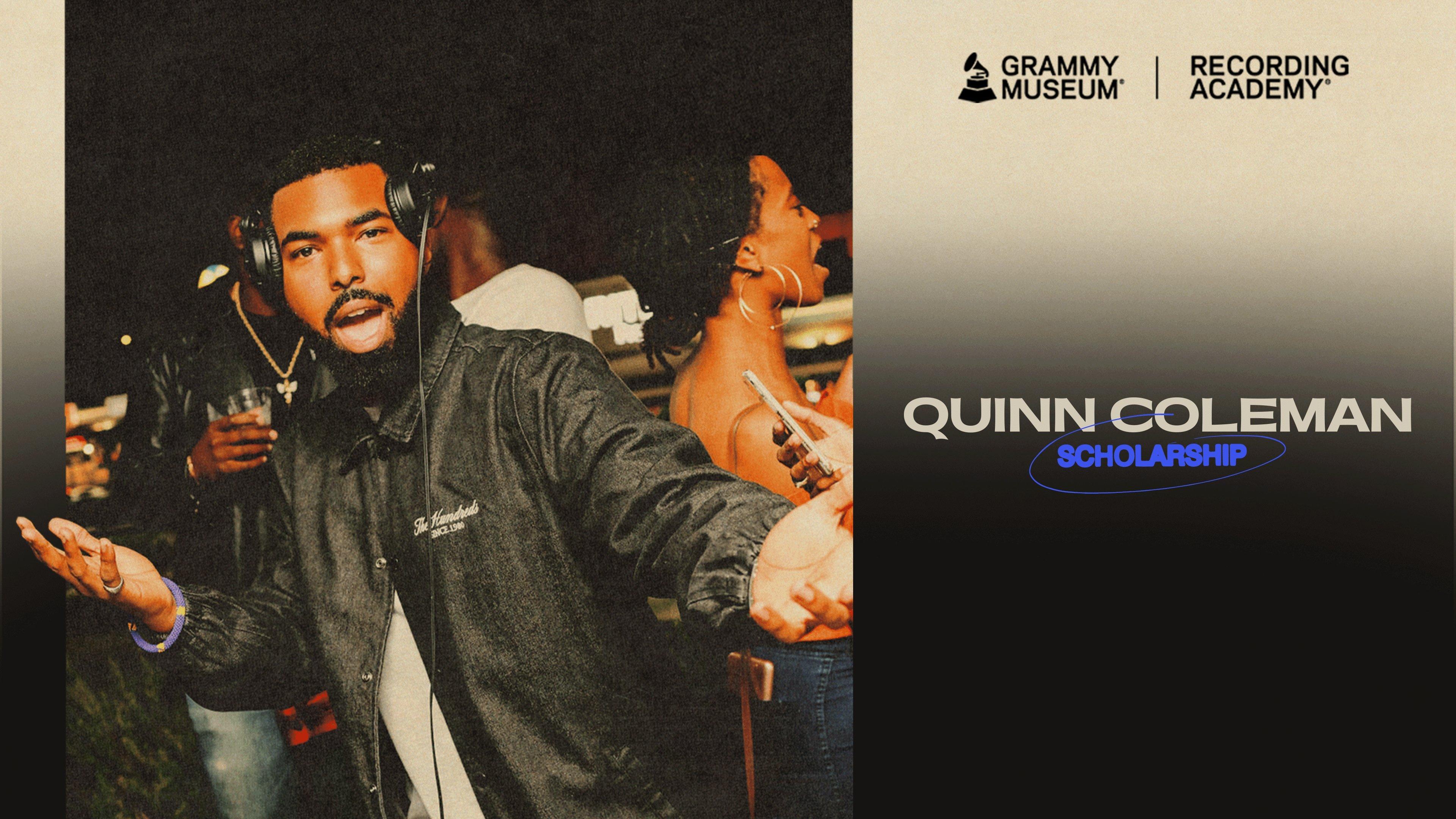
Image courtesy of the Recording Academy
news
Third Annual Quinn Coleman Memorial Scholarship Recipients Announced by GRAMMY Museum & Recording Academy
The Recording Academy is proud to announce the recipients of the Quinn Coleman Memorial Scholarship, a program designed to empower the next generation of music creators through a robust internship program and professional development opportunities.
The Recording Academy's Diversity, Equity and Inclusion team, in collaboration with the GRAMMY Museum, has announced the recipients of the third annual Quinn Coleman Memorial Scholarship.
This year, the scholarship honors five college students: Nadia Adams (University of Wisconsin-Milwaukee), Harrison Candelario (University of Rochester), Christo Hernandez (University of Southern California), Elyse Smith (Harvard University), and Hope Williams (Oakwood University).
Established in 2021, the Quinn Coleman Memorial Scholarship honors the legacy of Quinn Coleman, a cherished music executive and DJ who passed away in 2020 at the age of 31. Created by his family in partnership with the GRAMMY Museum, this scholarship aims to break down barriers in the music industry by offering professional development opportunities that prepare students for full-time careers, through financial aid, mentorship, and practical professional experiences.
Each selected recipient will be awarded two $1,000 scholarships for tuition, a $500 stipend for interview preparation, two $250 stipends for books and equipment, and financial and emotional wellness seminars. Furthermore, students will be awarded a spring internship at the Recording Academy or Latin Recording Academy.
For updates on the Recording Academy's DEI initiatives, click here. For more information about the GRAMMY Museum, visit grammymuseum.org.
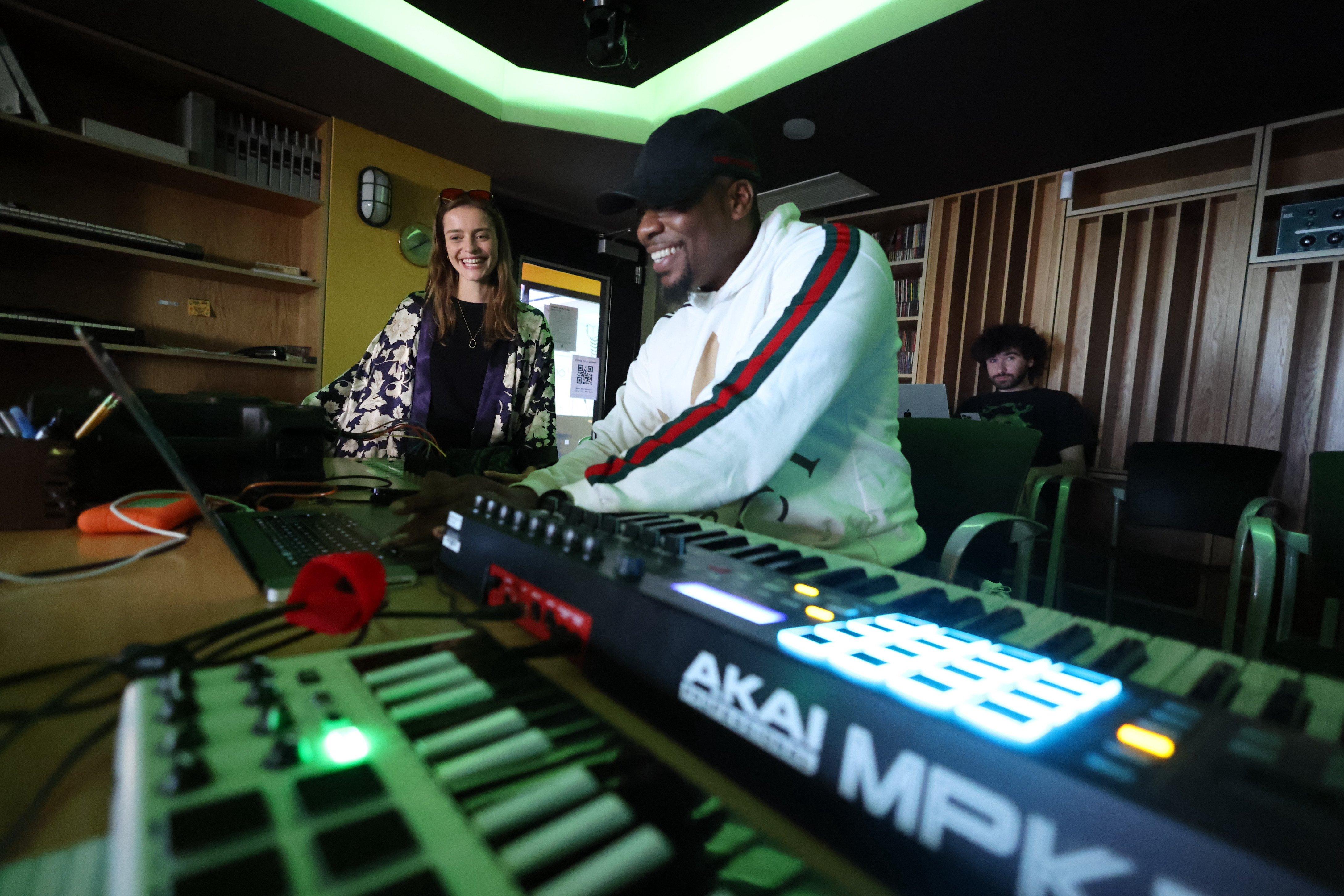
Photo: Rob Kim for Getty Images
news
The State Of Songwriting & Sync: 6 Takeaways From The Recording Academy New York Chapter's Songwriting Camp
From the importance of open-mindedness to the art of landing an ad placement, check out some of the most useful pieces of advice from the three-day event.
From Oct. 21 to 23, songwriters, composers, producers, engineers, and music industry professionals gathered at the NYU Clive Davis Institute of Recorded Music in Brooklyn, New York, to collaborate, network and support each other in navigating the ever-complex business-side of the music industry.
Presented in partnership with the Recording Academy's Songwriters & Composers Wing, the first two days were a highly collaborative songwriting intensive, where participants used the school's state-of-the-art studios to create songs for TV or film. Day three was all about empowering music makers, aptly titled, "Beyond the Studio: Navigating the Music Industry as Creators," and offered a plethora of useful advice across two insightful panels: "Crafting Hits: Songwriting in Today's Music Industry" and "Monetizing Your Music: Unlocking Opportunities in Media Licensing and Sync."
The first panel was moderated by NYU's own Professor Swagg (a.k.a. GRAMMY-winning producer and songwriter David "Swagg" Harris) and featured Samantha Cox, VP of Creative at BMI; Ian McEvily, artist manager and partner at State of the Art; and Travis McFetridge, president and CEO of Great South Bay Music Group Inc, a boutique music publisher. The second panel was moderated by singer/songwriter Toby Lightman and featured Josh Rabinowitz, professor and music consultant at the Brooklyn Music Experience; Jonathan Finegold, founder of Fine Gold Music; and Sue Jacobs, a music supervisor and founder of SueperVision.
Below, check out six useful takeaways from the intimate, informative event.
Versatility Is A Major Key To Success…
During the "Songwriting in Today's Music Industry" panel, Samantha Cox and Ian McEvily urged the importance of learning different skill sets as a songwriter. Cox pointed out that having a big pop star on a song doesn't guarantee a hit, even less so than in the past — even huge artists have had to diversify their sound and approach to stay relevant. "When I meet a young new songwriter, I always tell them to be open-minded to try a lot of different things," Cox said.
McEvily highlighted this point later in the conversation, when he was asked how he supports the artists he manages through the changing music industry landscape.
"The biggest issue starting out is money. It's really hard to be a songwriter and it hasn't gotten any easier. They used to be able to move out to LA and have a studio in their place, but now LA is expensive… To navigate that, I help them work past their skill set," McEvily explained. "I want to help them be able to be a Swiss Army knife, to be open. If you're just a songwriter and you're really lucky, maybe you'll make it. But [I want to] open you up for more opportunities."
McEvily reflected on how he encouraged his client of 10 years, GRAMMY-winning producer Dan Nigro, to learn production. When they met, Nigro was a songwriter and could produce lo-fi demos in GarageBand. Since then, he's honed his production chops and become Olivia Rodrigo's go-to producer and trusted collaborator, helping her perfect her chart-topping — and multi-GRAMMY-winning — pop-punk sound.
…And So Are The Relationships You Make
After an audience member asked whether an artist should have a manager, Cox stressed the importance of developing long-running personal relationships in the music industry. "Come talk to someone like me and I can link you with a rising songwriter and you can keep working together…And then maybe managers reach out," she emphasized. "Personal relationships are key."
McEvily agreed: "I think over the past five years, the relationship between the artist and the songwriter has become the most important relationship…and I think that makes it better."
For singer/songwriter and disability advocate James Ian, one of the biggest takeaways from the three-day event was the power that comes from gathering together with fellow music makers. While making music has mostly been a solo endeavor for him, he left feeling inspired to do more workshops and networking.
"Everyone was so generous with their time and their talent. We collaborated really, really well," he told GRAMMY.com. "Everyone was really willing to accept other people's ideas, and we used most of what everyone came up with in the songs. I'm really proud of the work, and really grateful to have networked and worked with such tremendous talent."
Read More: 4 Lessons & Resources Every Songwriter & Composer Should Know
You Might Be Missing Out On Money You've Already Earned
In between the two panels, The Mechanical Licensing Collective (MLC) and Sound Royalties — two of the event's sponsors — were highlighted for the work they each do to provide income streams for music creators. And as Jamie Dominguez, National Director of Industry Relations at The MLC, pointed out, the streaming era has resulted in a lot of unclaimed money.
The MLC is a nonprofit that was mandated after the passage of the Music Modernization Act in 2018, which set out important regulations to protect music creators in the streaming era. The MLC — which offers free membership — allows artists and songwriters to locate and receive streaming royalties dating back to 2007. Jamie Dominguez, National Director of Industry Relations at The MLC, encouraged participants to sign up, explaining they have paid out almost $3 billion in streaming royalties since their creation. Additionally, they are funded by the DSPs and don't take a cut of artists' earnings.
Attendees also learned about Sound Royalties, an artist-friendly funding source for creatives. For artists who earn $5,000 or more a year from music royalties, the firm offers advances to help you cover a tour, new studio equipment or whatever else to further your art. Sound Royalties doesn't take ownership of the artists' copyrights or a percentage of their futures, allowing artists to maintain control of their work.
One important thing that the first set of panelists noted, though, is that in order to get royalties, you have to be credited on the song. Thus, it's important to discuss songwriting credits and splits amongst collaborators before going into a work session. "Even if you brought in a song 90 percent done, the [producer's] chord progression change made it a hit, so that's worth something," McEvily said.
There's A World Of Possibility In Music Licensing
Following the in-depth discussion on the world of songwriting and a lively networking lunch, the second panel focused on how to earn money (and ears!) on your music through film, TV and ad placement. The career of moderator Toby Lightman — who has landed over 100 major song placements in film, TV and commercials as an independent singer/songwriter — was a shining example of the many opportunities that lie for musicians in the world of sync.
"When I got a song signed to a movie, it was life-changing, and now it's my artist focus," the "Breathe In" singer said with a smile. Her heartfelt music has been featured on TV shows such as "The Rookie," "Monarch," and "Sesame Street," as well as NFL ads.
For newer or independent artists, it might feel like a pipe dream to imagine your music being featured in a film trailer or a popular TV show. But as Lightman and her panelists suggested, there are ways in — especially since there are plenty of visuals these days that need backing music.
"A lot of the places I'm trying to support independent artists are those background scenes, [like in a] diner. The money can be quite good, but you'll need to have music that you put on and are able to have a conversation with somebody. If it's pulling your ear away, it's going to do the same in the picture," Sue Jacobs asserted. "[I'm looking for music] that someone can put under the dialogue to put into the next scene."
She also recommended that artists and producers have instrumental versions of their tracks ready to go, as they're more adaptable for different scenes. And if you want to see if your music could work in film or TV, put on a montage scene, mute it, and play your music.
"Film is not very forgiving of things that are just staying there and not changing," Jacobs, who has provided music supervision for Little Miss Sunshine, HBO's "Big Little Lies" and several other critically acclaimed films and shows, points out.
She advised that the music needs to be dynamic and have non-specific lyrics that can drive a variety of scenes. For this reason, Jacobs appreciates friendship songs over romantic love songs, as well as happy music that successfully steers away from cheesiness. Finally, she noted that when it comes to sounds and genres, "hybrid always works."
Read More: The Expanding Universe of Music Sync: How It Works, Understanding The Opportunities
Ad Sync Isn't Selling Out
When the "Monetizing Your Music" panelists were asked why they thought more artists are focusing on licensing now, Josh Rabinowitz pointed to Volkswagen's dreamy ad from 2000, featuring Nick Drake's "Pink Moon," as pivotal in changing the perception of syncing your music for commercial purposes. Though the spot came out 26 years after the British indie singer/songwriter's death, it brought a whole new, wider audience to his music and inspired future TV-ads-as-music-videos.
Jonathan Finegold also called out a Michelob beer ad from 1989, which featured guitar virtuoso Eric Clapton as another turning point in sync, along with Apple's iconic iPod commercials. He emphasized the market reach of that kind of placement, exemplified by Apple's ability to break songs and artists, such as Feist's iPod Nano ad (a song selected by Steve Jobs himself) from 2007.
As Rabinowitz offered, "It's music for context. It's not just music that's great, it has to serve in a particular capacity. It has to serve a creative idea, a concept, a brand, a brand's purpose, a product or sell persuasiveness, etc."
He described the best ad songs as anthemic with a positive message — tracks that are dynamic, unexpected and build, and don't sound mainstream. "I did a listening session the other day, and there was an Afrobeats track with a lot of humming and crazy beats. It was really warm and kind of universal in its positivity," Rabinowitz added. "That's exciting for me, and I think that's a great opportunity for people that are experimental and creative."
Landing An Ad Placement Is An Art In Its Own Right
As Finegold pointed out, if you are signed with a label or publishing company — even a small one — it's their job to pitch your tunes to music supervisors. He offered that it's something you can tee up for them by suggesting one of your tracks for a specific show or brand.
That said, there's no need to be obvious with your lyrics. In fact, Finegold warned that making songs with a brand in mind may have the opposite result.
"I would be careful about writing specifically for sync. A music supervisor can spot that a mile away," Finegold said. "If you write a song all about basketball and slam dunks, it doesn't mean that the NBA wants to use it. For the most part, they want to use a song about teamwork or coming together or winning or something like that."
Instead, you can create remixes of your tracks for specific scenarios, or craft unique reimaginings of well-known songs, as Finegold noted that the ad world has been big on unique covers in the past few years.
From honing songwriting skills to learning about the advantages of royalties and sync, the New York Chapter's Songwriting Camp offered an array of inspiration for those who attended. While being a creative in today's economy can be daunting, the event was a vital reminder of the power of community and collaboration — and how much further we can go when we share ideas, insights and resources.
The New York Chapter would like to offer thanks to the sponsors that made the event possible: The MLC, Sound Royalties, NYU Clive Davis Institute of Recorded Music, and Amazon Music, along with their Recording Academy event partner, the Songwriters & Composers Wing. Learn more about the S&C Wing on Instagram.
Latest Recording Academy News & Initiatives

The Recording Academy Producers & Engineers Wing To Honor Jimmy Douglass During 2025 GRAMMY Week Celebration

10 Meaningful Moments From The 2024 Latin GRAMMYs: Karol G's Heartfelt Speech, Tributes To Late Legends & More

Behind The Scenes At Latin GRAMMY Week 2024: Inside VIP Celebrations & More

Agris, DARUMAS, Ela Taubert, Kevin Aguilar & More Perform At The 2024 Latin GRAMMYs Best New Artist Showcase

Amazon Music & Black Music Collective Announce Fourth Annual 'Your Future Is Now' Scholarship Program For HBCU Students

Photo Courtesy of Dolly Parton. Photo: Jim Wright
list
5 Ways Dolly Parton Has Promoted Peace & Global Unity
As the 2024 PEACE Through Music Award honoree, Dolly Parton is celebrated for her humanitarian efforts and remarkable music career. Take a look at some of her most impactful acts of kindness and philanthropy.
Dolly Parton is almost as well known for her charitable spirit as she is for topping the country charts. The 10-time GRAMMY winner has made kindness, philanthropy and inclusivity major tenets of her life and career, and this year she's the 2024 recipient of the PEACE Through Music Award.
Parton accepted the honor at a special ceremony held at the GRAMMY Museum in Los Angeles on Oct. 25.
"Is that not what we're all looking for: a little peace?" the country icon asked in her joyful acceptance speech. "We all want it. Some of us, all around this old world, can only dream about it. But as people, we all deserve it."
Presented by the Recording Academy and the U.S. Department of State, the PEACE Through Music Award honors an American music industry professional, artist or group who has played an invaluable role in cross-cultural exchanges and whose music work advances peace and mutual understanding globally. The award launched last year as part of the Global Music Diplomacy Initiative; 28-time GRAMMY winner Quincy Jones was the inaugural honoree.
To celebrate Dolly Parton's 2024 PEACE Through Music Award honor, dive into five of the many ways she's demonstrated her commitment to the principles of peace, unity and inclusion throughout her celebrated career.
Giving Back Through The Dollywood Foundation
Parton first launched her namesake nonprofit, the Dollywood Foundation, in 1988 — just two years after opening the doors to her famed theme park, Dollywood. In the 36 years since its inception, the country star has used the foundation to encourage the importance of education in her native Tennessee. She first began raising money for scholarships given to local high school students before eventually launching the official Dolly Parton Scholarship in 2000.
Initially, Dolly's scholarship offered $15,000 to four students at Sevier County High School, the country icon's alma mater. However, to date, the scholarship program has expanded to award students in at least three other neighboring high schools, continually perpetuating the gift of education to rising generations where she was born and raised.
Promoting Childhood Literacy With Dolly Parton's Imagination Library
For decades, one of the pillars of the singer's philanthropic mission has been Dolly Parton's Imagination Library, the children's literacy program she founded in 1995 to honor her father, Robert Lee Parton, Sr.
Though the sharecropper and father of 12 never learned to read or write in his lifetime, his famous daughter's Imagination Library focuses on early childhood education by "gifting books free of charge to children from birth to age 5" throughout the U.S., Canada, the UK, Ireland, and Australia.
Working with local affiliate partners, Dolly Parton's Imagination Library has gifted more than 250,000,000 books and counting to children around the world as of press time. In July 2024, the program also reached a new milestone of registering 3 million children worldwide.
Assisting Wildfire Victims Through Her My People Fund
In 2016, Parton created the My People Fund, a new branch of her Dollywood Foundation, in response to the Great Smoky Mountains wildfires that devastated the Southeastern United States — including her beloved home state of Tennessee — that year.
Killing at least 14 people and burning down thousands of homes and businesses, the wildfires quickly became the deadliest in Tennessee history, and Parton's My People Fund aimed to help victims of the tragedy get back on their feet.
The charitable initiative gave $1,000 a month for up to six months to residents of Sevier County, Tennessee who had lost their homes and livelihoods to the blaze, and brought together major organizations like Verizon, Tanger Outlets and Miley Cyrus' Happy Hippie Foundation to donate to the cause.
"I have always believed that charity begins at home," Parton said at the time of the tragedy. Ultimately, the My People Fund helped more than 900 families affected by the crisis.
Parton's associated telethon, Smoky Mountains Rise: A Benefit for the My People Fund, also raised more than $13 million and featured appearances by Kenny Rogers, Reba McEntire, Alison Krauss, Cyndi Lauper and more.
Helping Fund The Moderna Vaccine
It's not an understatement to say that Dolly Parton is a major reason the world has one of the COVID-19 vaccines.
In the early days of the global coronavirus pandemic, the country star announced she was donating $1 million to fund research of the virus at Nashville's Vanderbilt University Medical Center. Parton's massive check helped fund early stages in developing Moderna's vaccine, and less than a year later, she received the potentially life-saving vaccine her donation played a part in creating.
Naturally, the singer also used her platform to encourage fans to get vaccinated as well — to the tune of "Jolene," naturally. It's virtually impossible to estimate just how many lives Dolly helped to save by this one act of generosity alone.
Championing LGBTQIA+ Rights Through Music & Advocacy
There's no denying Parton is a bonafide queer icon, and she's actively supported the LGBTQIA+ community for decades.
The "Coat of Many Colors" singer made a plainspoken reference to gay people, and the need to stand by them no matter what, in her 1991 ballad "Family." ("Some are preachers, some are gay/ Some are addicts, drunks and strays/ But not a one is turned away when it's family," she sang on the saccharine album cut from 1991's Eagle When She Flies.)
Nearly two decades later, she spoke out with her trademark wit in support of marriage equality during a 2009 appearance on "The Joy Behar Show." "I always say, 'Sure, why can't they get married? They should suffer like the rest of us do,'" the singer joked at the time, a full six years before the Supreme Court legalized marriage equality with the Obergefell v. Hodges decision.
Parton's support of the LGBTQ+ community hasn't been in words alone, either. The beloved icon has regularly supported HIV/AIDS charities during her time in the spotlight, including the Elton John AIDS Foundation and GLAAD.
Latest Recording Academy News & Initiatives

The Recording Academy Producers & Engineers Wing To Honor Jimmy Douglass During 2025 GRAMMY Week Celebration

10 Meaningful Moments From The 2024 Latin GRAMMYs: Karol G's Heartfelt Speech, Tributes To Late Legends & More

Behind The Scenes At Latin GRAMMY Week 2024: Inside VIP Celebrations & More

Agris, DARUMAS, Ela Taubert, Kevin Aguilar & More Perform At The 2024 Latin GRAMMYs Best New Artist Showcase

Amazon Music & Black Music Collective Announce Fourth Annual 'Your Future Is Now' Scholarship Program For HBCU Students
